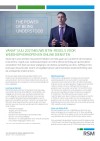As mentioned in our previous newsletter, the VAT rules for online sales of goods and services to private individuals will change in the European Union on 1st July 2021. The aim of this change is to better align VAT with the country where the private individual lives and at the same time reduce the administrative burden for the selling entrepreneurs.
The new rules will have major consequences for entrepreneurs who sell goods and / or services to private individuals online. It is therefore very important for these entrepreneurs to start preparing for these changes now.
Delivery of services
Currently, the so-called MOSS (Mini One Stop Shop) already exists within the European Union. Via the MOSS it is possible to declare the VAT due for specific online services in different Member States in one special VAT return to the Dutch tax authorities. The name MOSS will be replaced on July 1st 2021 by OSS (One Stop Shop). In addition, the list of online services for which it can be used is expanded to include the below*:
- Hotel stays
- Access to events
- Transport services
- Real estate services
- Rental of means of transport
- Restaurant and catering services for consumption on board ships, aircraft, trains, etc.
* please note, specific conditions may apply
Online sales
Entrepreneurs who sell goods to private individuals where the goods are shipped to another EU country and the entrepreneur is directly or indirectly involved in the transport of these goods will, from 1st July 2021, have to deal with VAT in the destination country more quickly. Until July 1st 2021, VAT of the destination country is due if a country-specific threshold (ranging from approximately € 25,000 to € 100,000) is exceeded. From 1st July 2021, a joint threshold of only € 10,000 will apply to all EU countries. Therefore, VAT will be due much faster from the country to which the goods are shipped. However, this foreign VAT can then be declared via the aforementioned OSS declaration.
Import from outside the EU
There is currently a VAT exemption on the import of small consignments (up to a value of € 22) from outside the EU. This exemption will expire on 1st July 2021 in order to remove the competitive advantage for goods coming from outside the EU.
For goods that are imported, the so-called I-OSS (Import One Stop Shop) is introduced. Sellers who can use the I-OSS do not have to pay import VAT, and only owe the VAT on sales to private individuals (comparable to sellers of goods within the EU).
In addition, there is a new regulation for situations when the buyer (consumer) imports the goods. Under this scheme, the buyer who imports the goods is the person responsible for paying the import VAT. However, the postal or courier company that offers the goods is the one that collects the import VAT from the buyers and pays it to the tax authorities.
Sales platform
In practice, it appears that under the current rules online sellers regularly (knowingly or unknowingly) do not pay the foreign VAT due. To combat this problem, from 1st July 2021, responsibility for the payment of the VAT due will lie with the sales platform in a number of circumstances. This concerns imported goods with a maximum value of € 150 and goods sold by entrepreneurs established outside the EU. In these circumstances, VAT is deemed as if the goods were sold by the seller to the sales platform and then by the sales platform to the consumer. The sale to the selling platform will be an exempt transaction, with the retention of deduction of input tax for the seller.
Register for the (I-) OSS
In the Netherlands, it has been possible for Dutch entrepreneurs to register for the (I-) OSS since 1st April 2021. The first declaration (the declaration for July 2021) can be submitted from 1st August 2021.
However, the Dutch Tax and Customs Administration’s ICT systems will not be ready in time for the new regulations. The Tax and Customs Administration are trying to compensate for this by deploying extra capacity for manual processing. However, it has already been indicated that processing times can increase considerably in the event of a large number of applications. We therefore advise entrepreneurs who want to use the (I-) OSS to register as soon as possible. If the notification is not processed in time, it may be that a VAT registration and VAT return is still required in every Member State where VAT is due.
Next steps?
As you have read, there will be a lot of changes on the 1st of July. To help you prepare for this, below we provide you with an action list:
- Register for (I-) OSS (possible from April 1st 2021)
- Determine which VAT rate applies to the products that you will be selling in other EU countries
- Redesign ERP system with, among other things, new VAT codes for foreign VAT
- Assess whether any current foreign VAT registrations should be maintained or whether they can be stopped
Further information
If you have any questions about the new VAT rules, please contact your trusted RSM advisor or the e-commerce-projectteam: [email protected].
Download 'New VAT rules for online sale of goods and services from 1st July 2021' in pdf.

